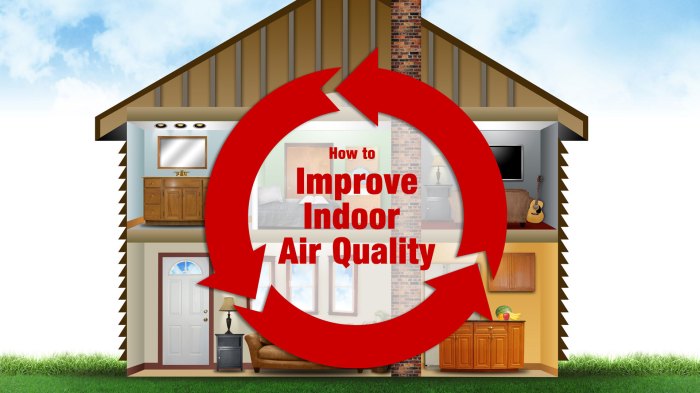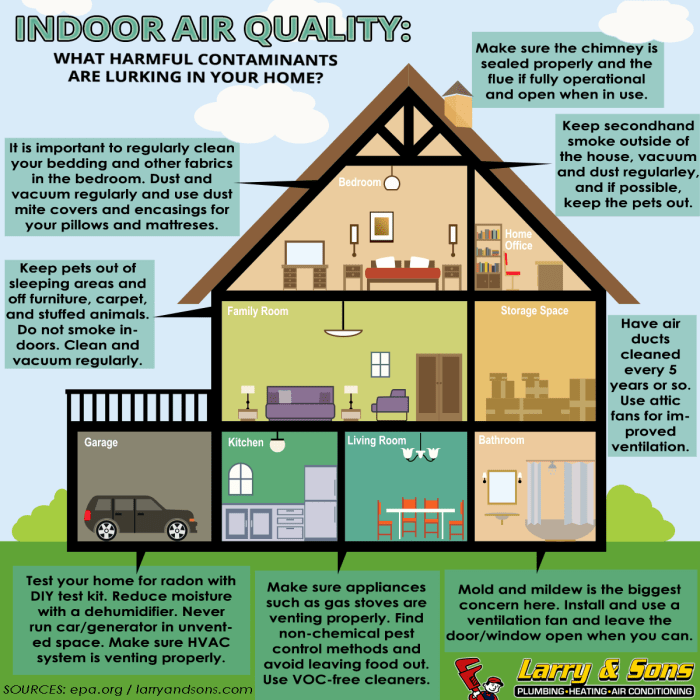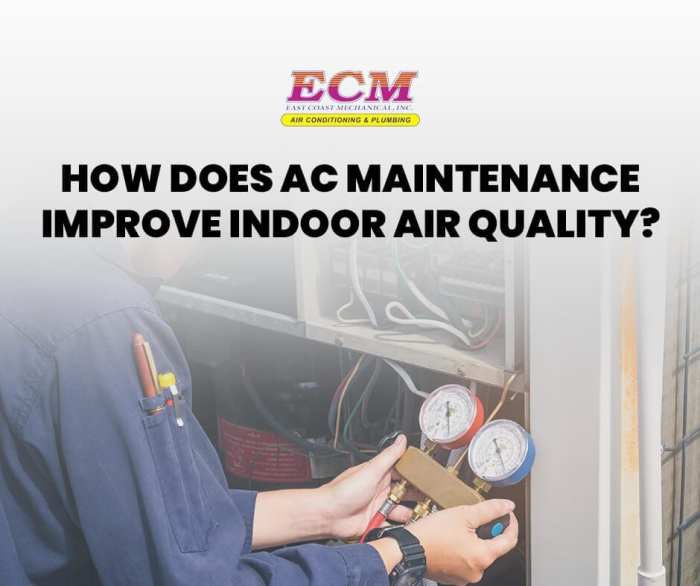How to improve indoor air quality through AC maintenance sets the stage for this enthralling narrative, offering readers a glimpse into a story that is rich in detail with research style and brimming with originality from the outset.
Regular AC maintenance is not just about keeping your system running smoothly; it plays a crucial role in ensuring the air you breathe indoors is clean and healthy. Neglecting AC maintenance can lead to poor air quality, affecting your health and comfort. Let’s delve into the importance of AC maintenance for indoor air quality and explore practical tips to enhance the air you breathe at home.
Importance of AC Maintenance for Indoor Air Quality

Regular maintenance of an air conditioning (AC) system is essential for ensuring good indoor air quality. Neglecting AC maintenance can lead to a variety of issues that negatively impact the air we breathe inside our homes or buildings. Let’s explore why AC maintenance is crucial for improving indoor air quality.
Impact of Neglecting AC Maintenance on Air Quality
- Dirty Filters: When AC filters are not cleaned or replaced regularly, they become clogged with dust, dirt, and other allergens. This can result in poor air circulation and a buildup of pollutants in the air.
- Mold Growth: Moisture buildup in the AC system can create a perfect environment for mold growth. Mold spores can be released into the air, leading to respiratory issues and other health problems.
- Poor Ventilation: A poorly maintained AC system may not be able to effectively circulate and filter the air, resulting in stale and contaminated indoor air.
Relationship Between AC Efficiency and Indoor Air Quality
Regular AC maintenance not only ensures that the system operates efficiently but also plays a significant role in improving indoor air quality. A well-maintained AC system can effectively filter out pollutants, allergens, and other harmful particles from the air, providing a cleaner and healthier indoor environment for occupants.
By keeping your AC system well-maintained, you can significantly reduce the risk of indoor air pollution and improve the overall air quality in your home or workspace.
Common AC Maintenance Practices

Regular maintenance of your air conditioning system is essential to ensure optimal indoor air quality. By performing key maintenance tasks, you can improve air quality and extend the lifespan of your AC unit.
Filter Replacement
Replacing the air filter in your AC system is crucial for maintaining good indoor air quality. A dirty or clogged filter can restrict airflow and allow dust, pollen, and other particles to circulate in your home. It is recommended to check and replace your filter every 1-3 months, depending on usage and the type of filter.
Cleaning Coils, Vents, and Ducts
Cleaning the coils, vents, and ducts of your AC system is another important maintenance task. Over time, these components can accumulate dust, mold, and other contaminants, which can negatively impact air quality. Regular cleaning helps to prevent the buildup of pollutants and ensures that your AC system is functioning efficiently.
Checking Refrigerant Levels
Monitoring and maintaining the refrigerant levels in your AC system is essential for optimal performance. Low refrigerant levels can lead to reduced cooling capacity and increased energy consumption. It is important to have a professional HVAC technician inspect and replenish refrigerant levels as needed to keep your AC system running smoothly.
Impact of Air Filters on Indoor Air Quality
Air filters play a crucial role in improving indoor air quality through AC systems by trapping airborne particles and pollutants, preventing them from circulating in the air. They help remove allergens, dust, mold spores, bacteria, and other harmful contaminants, leading to cleaner and healthier indoor air.
When it comes to maintaining your air conditioner, it is essential to follow the best air conditioner maintenance tips. Regular cleaning of filters, checking refrigerant levels, and inspecting for leaks are some of the key practices to ensure optimal performance.
Types of Air Filters and Effectiveness
There are various types of air filters available in the market, each with different levels of effectiveness in capturing pollutants:
- Fiberglass Filters: These are the most basic and inexpensive filters. They are effective in capturing larger particles but may not be as efficient in trapping smaller pollutants.
- Pleated Filters: These filters have a larger surface area for capturing particles and are more effective than fiberglass filters. They can trap smaller particles like dust and pollen.
- HEPA Filters: High-Efficiency Particulate Air (HEPA) filters are the most efficient at removing airborne particles. They can capture up to 99.97% of particles as small as 0.3 microns.
Choosing the Right Air Filter
When selecting an air filter for your AC system, consider the following tips to ensure enhanced air quality:
- Filter Efficiency: Choose a filter with a high Minimum Efficiency Reporting Value (MERV) rating to capture more pollutants.
- Filter Size: Ensure the filter fits properly in your AC system to prevent air leakage around the filter.
- Regular Replacement: Replace air filters regularly as recommended by the manufacturer to maintain optimal filtration efficiency.
Energy-Efficient AC Settings for Better Air Quality: How To Improve Indoor Air Quality Through AC Maintenance
Indoor air quality can be greatly influenced by the settings of your air conditioning system. By optimizing your AC settings for energy efficiency, you can also improve the quality of the air you breathe. Let’s explore some strategies for achieving this balance.
Optimizing Temperature and Humidity Levels
Maintaining the right temperature and humidity levels is crucial for both energy efficiency and air quality. Here are some recommendations to consider:
- Set the thermostat to a moderate temperature: Keeping your thermostat set between 72-78 degrees Fahrenheit can help save energy while ensuring comfort and air quality.
- Use programmable thermostats: Programming your thermostat to adjust settings based on your schedule can prevent unnecessary cooling or heating, reducing energy consumption.
- Maintain humidity levels: Aim for a humidity level between 30-50% to prevent mold growth and maintain a comfortable indoor environment.
Regular Maintenance for Optimal Performance, How to improve indoor air quality through AC maintenance
Proper maintenance of your air conditioning system is key to energy efficiency and air quality. Consider the following tips:
- Change air filters regularly: Clean filters improve airflow, reduce strain on the system, and prevent contaminants from circulating in your home.
- Schedule professional inspections: Regular maintenance by HVAC professionals can help identify issues early, ensuring your system operates efficiently and effectively.
- Check for leaks and ductwork issues: Sealing leaks and repairing ductwork can improve energy efficiency and prevent pollutants from entering your indoor air.
By optimizing your AC settings for energy efficiency and air quality, you can create a healthier and more comfortable indoor environment for you and your family.
Summary

As we conclude this exploration of improving indoor air quality through AC maintenance, it’s evident that regular upkeep of your AC system is essential for creating a healthy indoor environment. By following the maintenance practices and tips discussed, you can enjoy cleaner air and better overall well-being. Take charge of your indoor air quality today for a healthier tomorrow.
When it comes to maintaining your air conditioner, following the best air conditioner maintenance tips is crucial. Regular cleaning of filters, checking for leaks, and scheduling professional inspections are some key practices to ensure optimal performance.
To prevent mold growth in air conditioners, it is essential to keep the unit clean and dry. Regularly cleaning the condensate drain line, using a dehumidifier, and ensuring proper ventilation can help in preventing mold growth in air conditioners.
For seasonal air conditioner maintenance, make sure to clean the outdoor unit, check refrigerant levels, and change air filters regularly. Following seasonal air conditioner maintenance tips can prolong the lifespan of your AC and improve its efficiency.